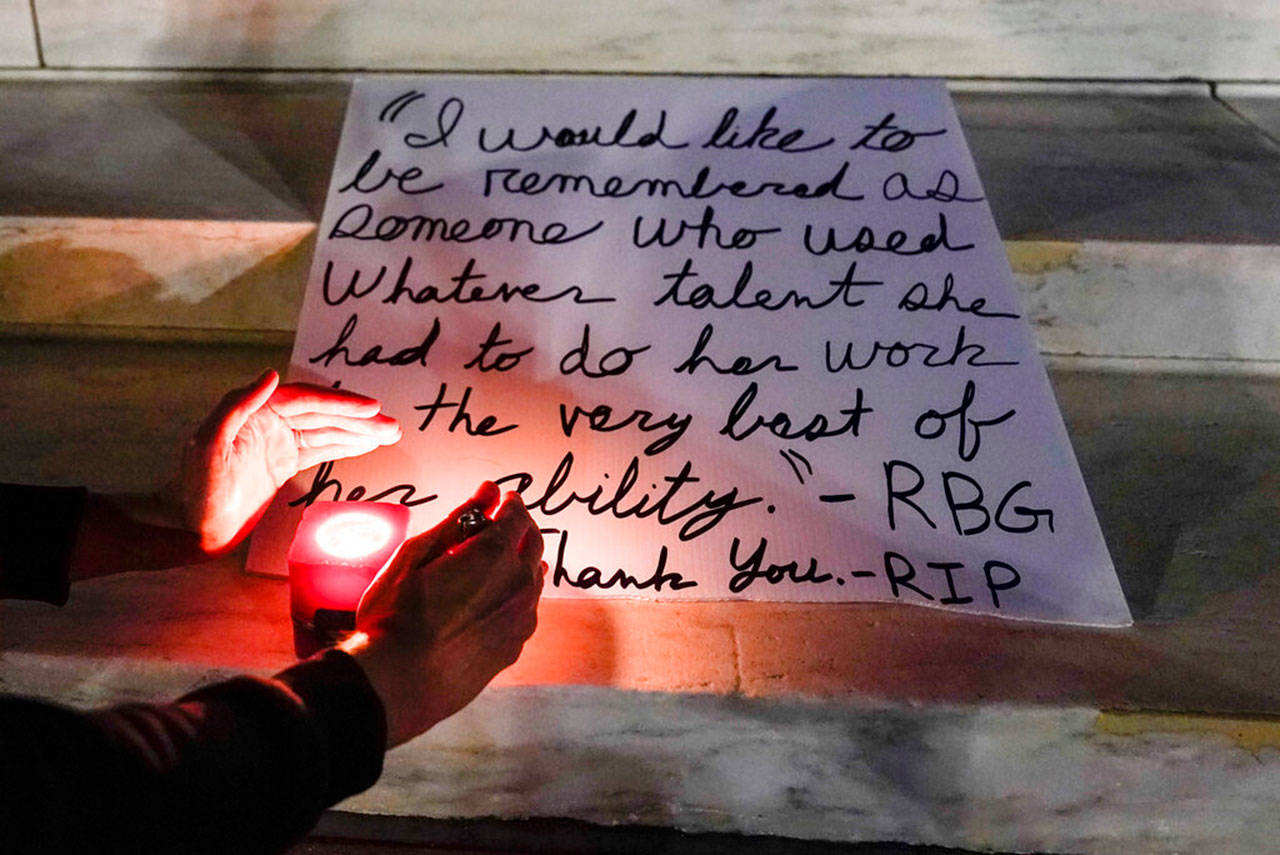By Edith Roberts / Special to The Washington Post
The most gratifying words of praise I’ve ever received were also the tersest: “Just right,” penciled in the margin of a draft opinion I had written as a clerk at the Supreme Court.
The author of those words, Justice Ruth Bader Ginsburg, died Friday at 87. She will be remembered as a woman who always knew exactly what she wanted to say and who worked tirelessly to get everything she did just right.
In conversation, she often paused for long spaces of time as she considered her next words, making you think she had finished with her train of thought. To fill what you assumed was an awkward silence, you blurted out some ill-considered words, then listened as she proceeded gracefully to her logical conclusion, unfazed by your clumsy interruption. That happened (more than once) at my interview for a clerkship with her on a federal court of appeals in Washington, before she became a Supreme Court justice, and she hired me anyway. Her husband, Marty, said it happened at the dinner table, too, so I suppose she had gotten used to it.
Her editing style was, well, just as focused. We clerks would send our draft opinions, freshly printed on crisp white paper, into the judge’s office. What we got back looked like a collage: cutout snippets of white letter paper glued to yellow legal pads, interspersed with blocks of penciled text in the judge’s perfect cursive. But after every scissoring and glue-sticking session came a sit-down with the judge, when she went through what she had changed and why, explaining each decision and showing us how to write more clearly. Over the course of the clerkship, our marked-up drafts became more white than yellow.
You might think that such a “precise female,” as Justice Harry Blackmun called her after her first oral argument before the Supreme Court, might be all intellect and no heart. But Ginsburg was one of the purest romantics I have ever known. Maybe it was because she found her soul mate, Marty Ginsburg, so early on, and because they had such a long and fulfilling marriage. Maybe it sprang from the same source as her love of music, and the delight she took in dressing up as a 17th-century aristocrat — in a brocade gown and powdered wig — to be an extra in an opera.
Whatever the reason, Ginsburg deployed her eagle eye for details to spot love affairs blossoming around her. My now-husband, Matt, and I were law-school classmates who both ended up as Ginsburg clerks on the U.S. Court of Appeals for the District of Columbia Circuit. We had begun dating, and living together in an apartment he had rented, after Ginsburg hired us but before starting our jobs. Nervous about whether Ginsburg would want personal relationships intruding into the workplace, we kept quiet about our new status and didn’t update my home address or phone number with her secretary. Yet one Saturday morning, early in the clerkship year, a call came to Matt’s apartment from the judge; for me, about one of my cases.
Far from disapproving of our involvement, the judge was delighted. The more clerk couples, she felt, the merrier. In fact, she once invited us and the two other sets of married Ginsburg clerks (there are probably many more now, if she had anything to say about it) out for a Valentine’s Day dinner at a pan-Asian restaurant. Dessert included specially ordered fortune cookies containing some fairly schmaltzy lines from an Eskimo love song that Matt and I had recited to one another at our wedding; at which a beaming Ginsburg officiated.
A natural-born judge, she was not at all judgmental. Though she spent most of her career as a women’s rights pioneer, working to ensure that other women would not, as she did, have to hide their pregnancies under baggy clothing to keep their jobs, she never made me feel she disapproved of my decision to exit the full-time legal market for 23 years while raising my children. Instead, she went out of her way to maintain my professional currency, asking me to speak at awards events and to write a biographical entry for her, and recommending me wholeheartedly for the job I eventually returned to.
This slow talker, ruthless editor and die-hard romantic wanted to make sure that every woman could find her best place, whether in a military-academy classroom, on the floor of a factory or behind the wheel of a minivan. She wanted the women who came after her to have the chance to get things — for themselves, as she did so often for herself — just right.
Edith Roberts, the former editor at SCOTUSblog, clerked for Judge Ruth Bader Ginsburg on the U.S. Court of Appeals for the District of Columbia Circuit.
Talk to us
> Give us your news tips.
> Send us a letter to the editor.
> More Herald contact information.

























